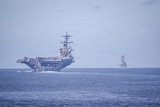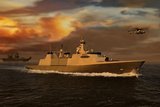Fincantieri cuts steel for first Doha-class corvette
Fincantieri has cut first steel for the first Doha-class corvette ordered by the Qatari Ministry of Defence within the national naval acquisition programme, the company announced on 30 July.
The $4.67 billion contract awarded to Fincantieri envisages the supply of seven surface vessels, including four corvettes, one landing platform dock-amphibious vessel and two offshore patrol vessels, as well as support services in Qatar for further ten years after the delivery of the vessels.
The first Doha-class corvette will be capable of fulfilling tasks ranging from surveillance with sea rescue capacities to serving as a combat vessel.
The 107m-long, 14.7m wide vessel has a maximum speed of 28kt. It will be equipped with a combined diesel and diesel turbine plant and will be able to accommodate 112 persons on board, including 98 crew members.
Furthermore, the vessel will be capable of operating rigid hull inflatable boat through lateral cranes or a hauling ramp located at the far stern. The flight deck and hangar are sized for hosting one NH90 helicopter.
All the vessels will be built at Fincantieri Italian shipyards with the construction starting from 2018.
More from Naval Warfare
-
![UK’s Fleet Solid Support ship programme deemed on track despite steel supply concerns]()
UK’s Fleet Solid Support ship programme deemed on track despite steel supply concerns
Shipbuilders are saying the programme is going ahead on time as the government estimates 7.7 million tonnes of steel are needed for 2026 infrastructure projects.
-
![As Indonesia doubles up its order, who else is looking at the Arrowhead 140 frigate design?]()
As Indonesia doubles up its order, who else is looking at the Arrowhead 140 frigate design?
The adaptable design of Babcock’s Arrowhead 140 frigate, already selected by the UK Royal Navy and Poland, has led to more orders from Indonesia while other countries continue to weigh it up.
-
![US Navy to invest more than $700 million in laser-related R&D efforts in FY2026]()
US Navy to invest more than $700 million in laser-related R&D efforts in FY2026
The US Navy’s acceleration of its laser weapon development initiatives reflects a decisive shift towards ultimately having a “laser on every ship” across tomorrow’s surface fleet.





















